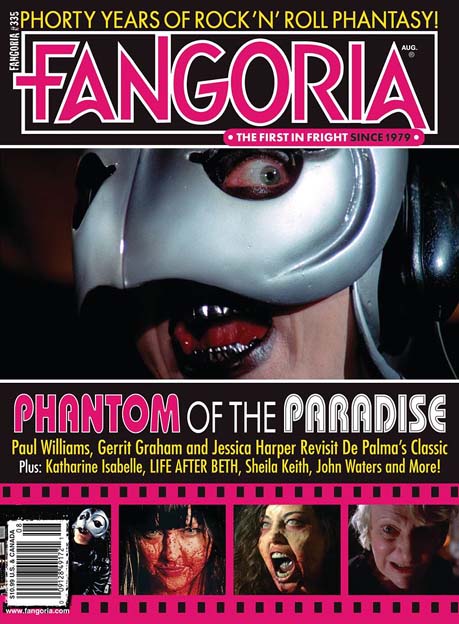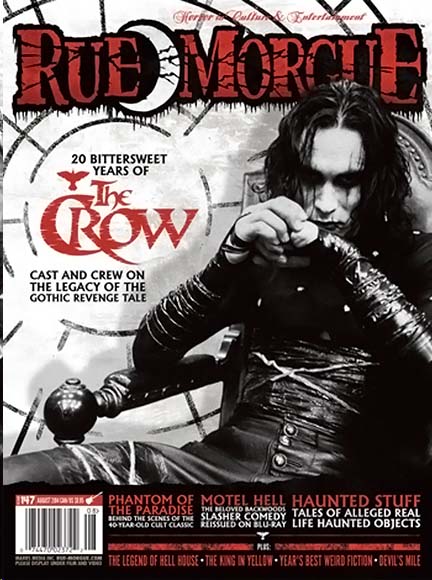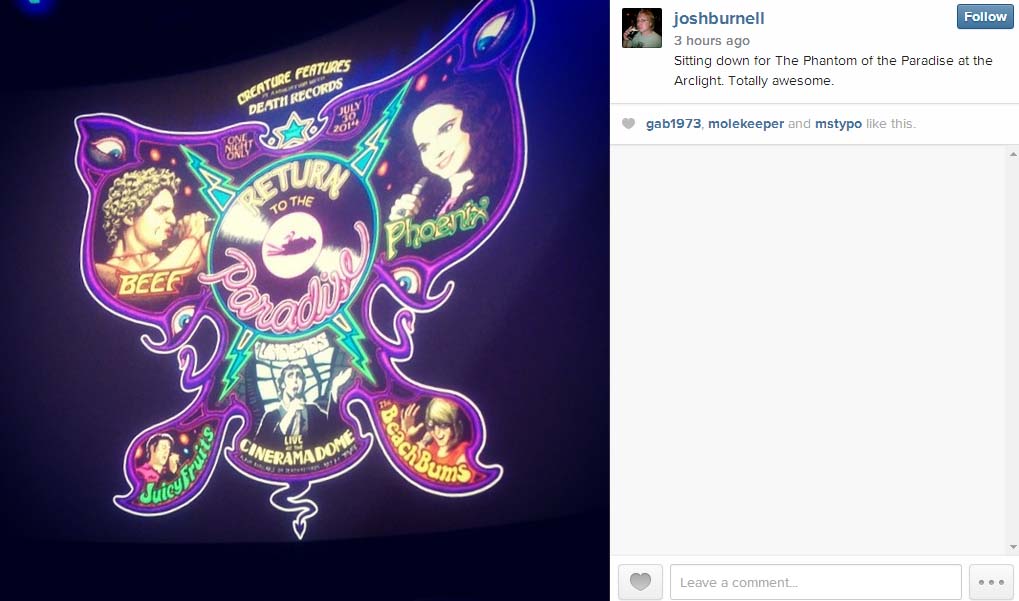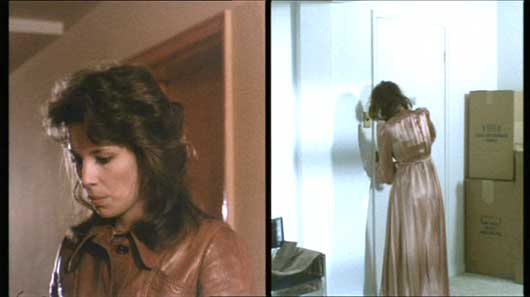'PHANTOM' IS MOVIE OF THE WEEK @ THE DISSOLVE
AND SOME LINKS SURROUNDING REACTION TO SCREAM FACTORY'S NEW BLU-RAY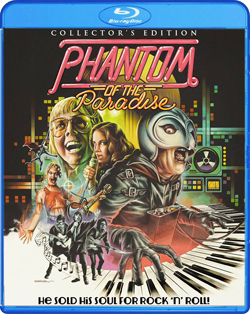
I'm still delving into the treasures of Scream Factory's new Blu-ray release of
Brian De Palma's
Phantom Of The Paradise, but I can say that the new interviews with De Palma and (separately)
Paul Williams are full of insights into the ideas and production of the film, and the brief interview with make-up effects artist
Tom Burman is also quite interesting (Burman never met De Palma while working on it, but became a fan after seeing the finished film, which he still thinks is one of De Palma's best). And being able to see the alternate takes and outtakes side-by-side with the completed film versions, in high-definition, is also very, very nice.
Thanks to all the attention brought on by this new release,
The Dissolve is featuring
Phantom Of The Paradise as its Movie Of The Week this week. What does that mean? Well, each week, The Dissolve features a Movie Of The Week, inviting staff and readers to watch the movie prior to a forum they publish on Wednesday in which the staff discusses the film, and encourages readers to continue the discussion in the comments section. The day before, Tuesday, will see a Keynote essay, and Thursday brings another essay focusing on one aspect of the film. So, here's what
Noel Murray wrote on the site as to what we can expect:
-----------------------------The Dissolve staff is populated by several rabid De Palma fans, who’ll be convening for our Movie Of The Week Forum next Wednesday to discuss what De Palma had to say about art and commerce circa 1974, and how he said it in the language of some of the great expressionist filmmakers of the 20th century. Prior to Wednesday’s Forum, I’ll be writing Tuesday’s Keynote essay about how De Palma uses split screens and layered action in Phantom Of The Paradise to suggest that there’s more going on in the film than just a broad spoof. And then on Thursday, Alan Jones will look into a how a movie that bombed at the box office in the United States became a Rocky Horror Picture Show-level cult hit in Winnipeg. If you’d like to join in on the conversation, Phantom Of The Paradise came out this week on a features-packed Scream! Factory Blu-ray, and is available for rent or purchase from multiple online video retailers. So just sign this 1,000-page contract in your own blood (skip the fine print, which is just there for your own protection), and take your place in line. The Paradise will open next Tuesday.---------------------SOME LINKSMarc Mohan, The Oregonian"Movies don't get much more cult-friendly than Brian De Palma's 1974 freakfest, which was inspired by the director hearing a Muzak version of a
Beatles song in an elevator. The idea of a beautiful song being transmuted into garbage by the music industry eventually evolved into the strangest retelling of the 'Faust' legend ever put to film...
"The hyper-saturated colors and varied soundtrack (which Williams supervised) make Phantom a worthwhile Blu-ray purchase. The jam-packed collector's edition from Shout Factory includes a new, 50-minute documentary on the film's making, a commentary track with several of the actors, and an interview with De Palma in which he admits to being a fan of the reality show Survivor.
"The highlight, though, is an amiable, wide-ranging chat, over an hour long, between Paul Williams and Pacific Rim director Guillermo Del Toro, who seem to be old pals. Unexpected? Sure, but no more so than anything on screen in Phantom of the Paradise."
Sean Lass, Playback: stl
"I don’t even know how to begin talking about 1974’s Phantom of the Paradise. How can I describe this film to anyone who hasn’t seen it? The plot is fairly straightforward (a modern retelling of The Phantom of the Opera, with elements of Faust and other classic stories thrown in), but the overall experience of the film is so wonderfully weird and unique that you really just have to see it for yourself. And you should, because it’s an absolute blast."
John Semley, MacLean's
HEADLINE: "Was Winnipeg right about Phantom of the Paradise all along?"
"Rod Warkentin was born and raised in Winnipeg. He saw Phantom with his sister at the Garrick Theatre when he was 10. He estimates he saw it 29 more times in its initial Winnipeg run. 'It caught on with word-of-mouth,' he explains. 'Something about it appealed to the youth. Anyone who’s our age who grew up in Winnipeg, you ask them about it and they’ll say, "Oh yeah, it’s phenomenal."’...
"The story goes that Guy Manuel de Homem-Christo and Thomas Bangalter of Daft Punk met as teens at a Paris screening, launching a creative partnership that culminated in a collaboration with Williams on their 2013 hit record. 'They saw Phantom of the Paradise together more than 20 times,' Williams boasts. 'It’s their favourite movie!'
"It’s odd drawing a line between French techno-pop icons and 50-year-old Winnipeggers. But Phantom has a universal quality. 'I’m reluctant to call myself a sex symbol, but Swan was sexy,' says Williams. 'I think it showed people that you could still get things if you were the runt of the litter.' For Warkentin, Phantom’s recuperation has more to do with the unforgiving pessimism that boils beneath the campy veneer. It’s the sort of thing that would naturally play with self-persecuting adolescents, from Paris to the ’Peg. 'Nobody gets what they want in the film,' he notes. 'No one wins.'”
Glenn Kay, CinemaStance
"It’s an excellent movie that was ahead of its time and satirically skewers not only the music business as a whole, but the fans who clamor for more. By the time it’s over, showmanship begins to mesh with reality all for the sake of entertainment – the film’s villain even plots an on-camera assassination of an artist to boost record sales. It’s hard to watch and not think about how many things about the industry that it predicted forty years ago. The movie is well cast with both likable and memorable characters, who all desire fame and public success to some degree and ultimately pay a high price for it.
"It is also a striking, visual treat highlighting a wildly exaggerated color palette. As expected, director De Palma’s camera moves are also incredible, some memorably shot sequences. One standout is an event staged and filmed with two cameras in splitscreen while other notable moments feature unique angles or are filmed in rooms filled with giants mirrors – it’s amazing that the camera itself never appears to be visible in any of these scenes at any point."
Jeffrey Kauffman, Blu-ray.com
"Paul Williams is certainly one of the more unlikely multimedia stars of his generation. Elfin in appearance and kind of generally odd looking anyway, Williams also has a kind of nasal singing voice that's unvarnished but hardly a technical marvel. And yet this diminutive sprite has managed to chalk up not just scores of film and television appearances, but innumerable hit records (albeit sung by other, perhaps more vocally gifted, artists). While Williams had already managed to carve out a few lesser acting roles by the time he made Phantom of the Paradise in 1974, he was already a show business phenomenon courtesy of his still impressive songwriting skills. Both on his own and with his frequent collaborator Roger Nichols, Williams had become the go-to hitmaker for such chart topping acts as The Carpenters ('Rainy Days and Mondays', 'We've Only Just Begun') and Three Dog Night ('Out in the Country', 'An Old Fashioned Love Song'). Still, as even Williams himself seems to realize in the interview included on this Blu-ray as a supplement, he seemed like an odd choice to both provide the song score and star in Brian De Palma's whimsical reimagining of a kind of mashup between The Phantom of the Opera and The Picture of Dorian Gray. Phantom of the Paradise's song score is a pastiche driven amalgamation that runs the gamut from singer-songwriter confessional material to proto-fifties' doo-wop outings, and neither of those idioms, nor anything else musical in the film, would seem to suggest Paul Williams as the perfect choice. But Williams had already begun to stretch musically, as evidenced by his facile lyrics for the criminally underappreciated pop-rock cantata Wings by the late French master Michel Colombier. (Colombier had a noted—no pun intended—if also underappreciated film scoring career, including the recently released Une Chambre en Ville.)...
"Phantom of the Paradise might seem like an unlikely effort from the likes of Brian De Palma, but the film actually traffics in many of the same ideas that have informed some of his more commercially successful films like Carrie. Once again there's a lonely outcast who's specially 'gifted', and once again carnage explodes when the outsider isn't given his or her due. While there's no religious subtext here a la Carrie (unless one subscribes to the opinion that rock is religion), there's a sinister melancholy that creeps through the film that seems to suggest that poor Leach has been abandoned not just by his fellow man, but by whatever Divine presence there may (or may not) be in the world. Finley delivers an amazing performance in this film, all the more remarkable in that virtually his entire face is hidden behind a helmet, and really only his mouth and one eye are visible. But the anguish and rage of this character are virtually palpable almost all of the time.
"The film is a visual phantasmagoria, one of De Palma's most hallucinogenically outrageous achievements in production and costume design. The finale of the film is like a rock concert being run by and attended by a pack of wild, peyote intoxicated, wolves. Through it all, Williams' music (and even his voice—he serves as the singing voice of Leach) wends its way through innumerable genres as The Juicy Fruits change both their band name and their look (repeatedly). Williams was something of a 'staff writer' at A&M Records, arriving at the label just as Carpenters were taking off to be the biggest act of the early seventies. While Williams disparages many of his tunes as mere 'easy listening' fodder, his oeuvre during this period is really rather impressively diverse. This proved to be Williams' second Oscar nomination (the first was for the prior year's 'Nice to be Around' from Cinderella Liberty, which Williams co-wrote with another Williams, John), and while he didn't take home the trophy that year (Nelson Riddle received what was probably a 'career Oscar' for The Great Gatsby), it's probably Williams' score that is one of Phantom of the Paradise's most enduring achievements. You might even say the song score is devilishly good."
Budd Wilkins, Slant
"Phantom of the Paradise doubles down on the winking intertextuality that has always characterized De Palma's cheekiest work. The film's broad-strokes indebtedness to its thematic forebears (Faust, The Phantom of the Opera, The Picture of Dorian Gray) is noticeable enough to be spotted through the blinkered monocular gaze of the Phantom's helmet. And with its riotous Psycho 'shower scene' riff, De Palma crams a plunger over the puss of detractors who dismissed him as little more than a discount-Hitchcock rehash slinger. But the finer-grained citations are there for the delectation of eagle-eyed cinephiles: The bomb in the trunk of the Beach Bums' jalopy carries more than a Touch of Evil, and Swan's attempted assassination of Phoenix on live TV sets its sights on John Frankenheimer's scarily prescient The Manchurian Candidate.
"That's not to discount the finale's profound resonance with other De Palma films. The orgiastic revelry of the wedding distinctly recalls Dionysus; in fact, De Palma had members of that film's cast planted among the extras to whip up their frenzy. And there's more than a whiff of 'Be Black, Baby' from Hi, Mom! in the scene's avant-garde theatrical staging. Then again, the conflation of political assassination and public spectacle points to Blow Out, the one film that stands shoulder-to-shoulder with Phantom of the Paradise for the disconsolation of its final moments. This is De Palma pouring the new wine of his formal inventiveness and anti-authoritarian irreverence into the old bottles of archetypal myths, and it remains a supremely entertaining anomaly within his filmography, yet entirely emblematic of his filmmaking sensibilities."
Patrick J. Doody, Retroist
"Man, this is a weird movie. Not just like 'trippy' because it’s from the 70s, but it’s…really out there and I loved it. I think I responded to the material because the look and sound of the film is not only pure pop art, it’s authentic pop art. It never feels like DePalma tried to make a 'modern' or 'hallucinatory' film that the young people could understand. He made a film that used the look and style of the period and then made it his own. It’s not cheesy or trying to be cool, it just is cool and it totally holds up."
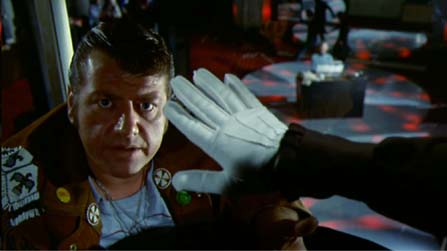 As we mentioned the pther day, Phantom Of The Paradise is the Movie Of The Week at The Dissolve this week, and things kicked off Tuesday with Noel Murray's terrific Keynote essay, "The double vision of Phantom Of The Paradise."
As we mentioned the pther day, Phantom Of The Paradise is the Movie Of The Week at The Dissolve this week, and things kicked off Tuesday with Noel Murray's terrific Keynote essay, "The double vision of Phantom Of The Paradise."



 I'm still delving into the treasures of Scream Factory's new Blu-ray release of Brian De Palma's Phantom Of The Paradise, but I can say that the new interviews with De Palma and (separately) Paul Williams are full of insights into the ideas and production of the film, and the brief interview with make-up effects artist Tom Burman is also quite interesting (Burman never met De Palma while working on it, but became a fan after seeing the finished film, which he still thinks is one of De Palma's best). And being able to see the alternate takes and outtakes side-by-side with the completed film versions, in high-definition, is also very, very nice.
I'm still delving into the treasures of Scream Factory's new Blu-ray release of Brian De Palma's Phantom Of The Paradise, but I can say that the new interviews with De Palma and (separately) Paul Williams are full of insights into the ideas and production of the film, and the brief interview with make-up effects artist Tom Burman is also quite interesting (Burman never met De Palma while working on it, but became a fan after seeing the finished film, which he still thinks is one of De Palma's best). And being able to see the alternate takes and outtakes side-by-side with the completed film versions, in high-definition, is also very, very nice.
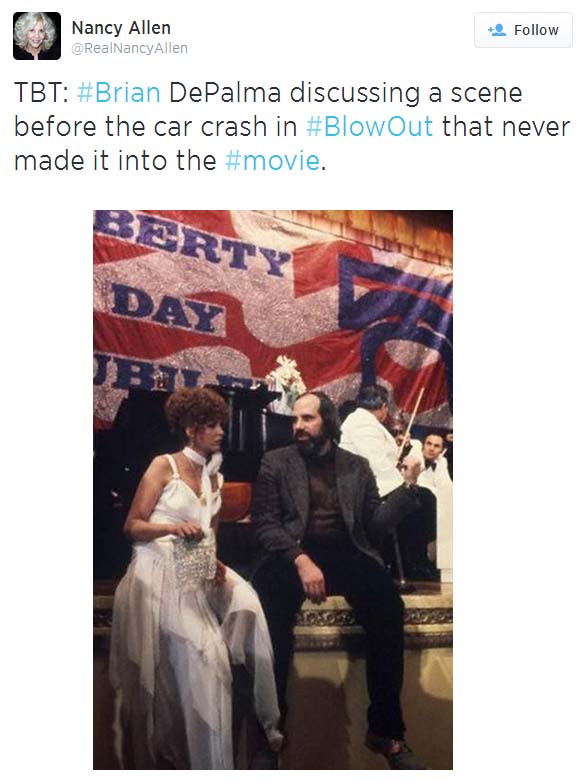
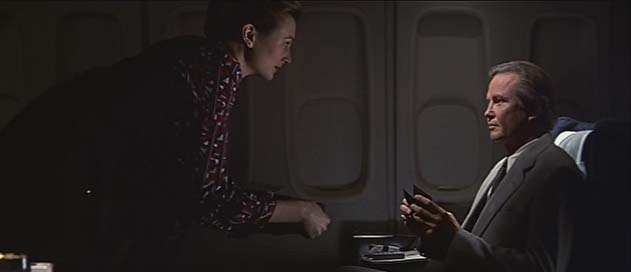
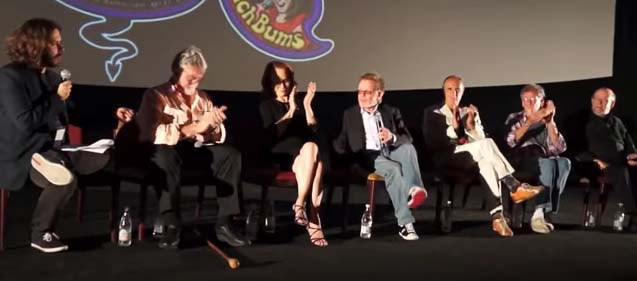
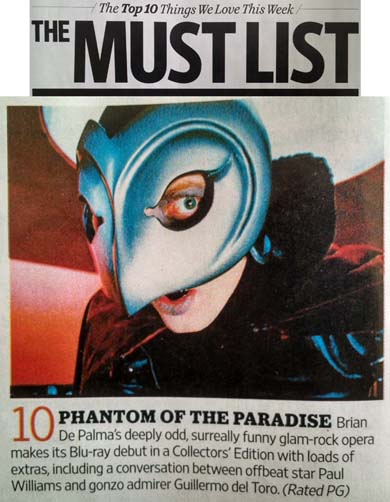 Phantom Of The Paradise has made this week's "Must List" in the current issue of
Phantom Of The Paradise has made this week's "Must List" in the current issue of 